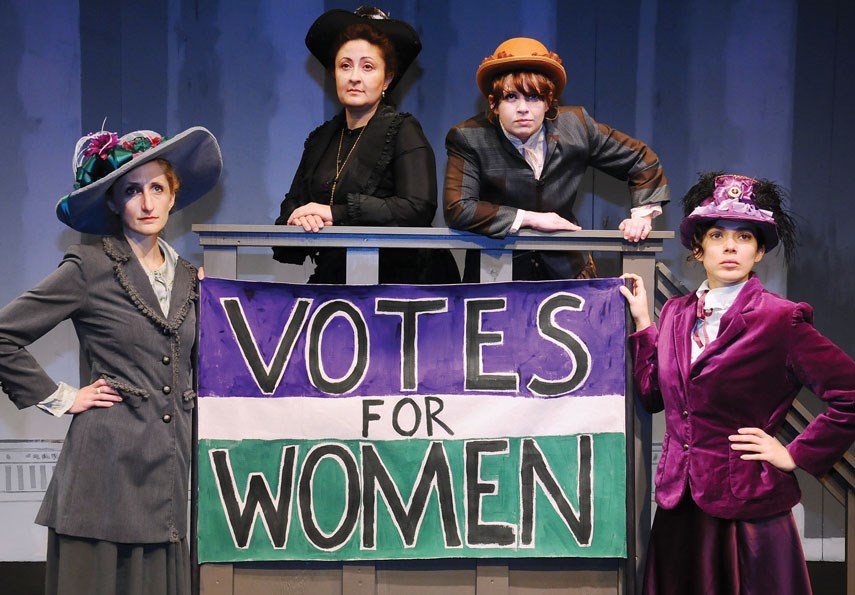Rebel Women, Deep Cove Shaw Theatre, Oct. 12 – 27, deepcovestage.com.
As many get set to count votes in the upcoming municipal election, a play showing at Deep Cove Shaw Theatre is paying homage to the importance of elections by counting backwards.
Rebel Women, a historical drama written by Joan Bryans and directed by Sarah Arnold, examines the militant leg of the suffragette movement in early 20th century Britain. It’s showing at the theatre starting tonight and running until Oct. 27.
“People vaguely know about suffragettes,” notes playwright Bryans, who started writing the show in 2013 and saw it staged for the first time the following year. “They hold them in esteem in some way.”
It was her intention with the play, says Bryans, to further expose people to the amazing story of the individuals who fought for women’s suffrage, or the right to vote in publically held elections.
“I would like them to know just how hard they had to battle, and how big the victory was,” according to Bryans.
The stars of Bryans’ play include real-life characters such as the venerable Emmeline Pankhurst, a political activist and leader of the British suffragette movement. The action of the play starts around 1909, coinciding with, according to Bryans, “The first time a suffragette woman is sent to jail for something she’s done in Britain. … It follows their story as they grow from a very tiny little organization, set up in Mrs. Pankhurst’s front room, and it grows and grows.”
Of the dozen or so female characters in Rebel Women, Bryans also mentions Christabel Pankhurst, a founder of the Women’s Social and Political Union and activist daughter of Emmeline Pankhurst, as well as Annie Kenney (“She’s a working class mill girl from the north…”) as other individuals of note when it comes to the militant suffragettes in her play.
The show’s set in London and introduces the audience to women from a wide swath of society, from mill workers such as Annie Kenney, to aristocrats who started mobilizing in a real way in the early 20th century due to mounting injustice and gender inequality.
“As a playwright I’m always looking for good stories,” says Bryans, adding that she became swept up by the suffragettes’ story after reading a transcript of Emmeline Pankhurst’s legendary Freedom or Death speech while riding the bus one day, a vocal invocation that Pankhurst delivered in 1913 encouraging women to break the law in order to achieve what was deemed Votes for Women. “It’s one of the best 10 speeches ever made. … I’m reading this thing and I think I have to do a play, I have to write a play with this speech in it.”
Bryans did just that. Rebel Women is described as a “theatre verbatim play,” meaning that almost all the dialogue and speech in the production is culled from the actual words – from speeches, letters and even songs – uttered by individuals from the women’s movement.
“A good 95 per cent of it is their words completely,” says Bryans. “They’re all coming from all walks of society, so you’ve got working class and aristocrats and they’re all talking their own language but getting on with each other and finding common bonds. I couldn’t have written that – I wouldn’t have the expertise. It’s real, it’s their language.”
The play holds some historical significance, especially this year, according to Bryans, noting that 100 years ago women in Britain inched a little closer towards true equality when a variety of political reforms were passed granting many women the right to vote. Canada and the U.S. followed a similar timeline when it came to granting women similar rights.
“The demands on them as individuals gets greater and greater and as they go onto jail they go on hunger strike. Just horrific what those women went through,” notes Bryans. “(But) it ends victorious, they got the vote.”
For Bryans, writing Rebel Women a few years back was a continuation of a constant theme in the longtime theatre actor, writer and director’s work. She founded Vital Spark theatre in 2002, and currently serves as artistic director, where the production company’s mandate is: “… breathing fresh life into the old; shining lights in dark corners; and giving voice to the unheard and the forgotten of history.”
“I seem to always be writing about strong women battling against the odds and winning. It didn’t dawn on me until quite recently,” she says.
And while Bryans argues that her play about the militant suffragette movement is a “good-news story,” one where the participants “fought a battle and through enormous odds they won,” she notes that the avalanche of current events and political affronts at home and abroad these days make its message all the more prescient.
“The battle continues.”



